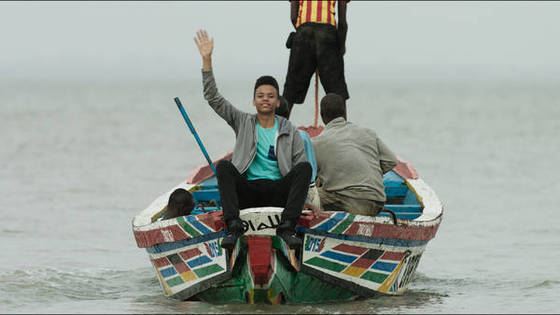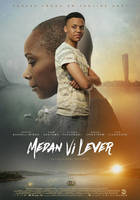African Cinema in the Spotlight Thanks to AfricaDays@HEC Paris
While we live is the sixth full-length feature film by Dani Kouyaté, son of Sotigui Kouyaté, one of the greatest African actors of the 20th century. On February 12, 2018, a snow-covered Jouy-en-Josas campus hosted the Franco-Burkinabe director, currently based in Stockholm, to share this Homeric story with an audience made up of students and staff from HEC Paris. This modern fable marked the second African Cinema evening organized by the AfricaDays@HEC Paris 2018 team.

This year, HEC Paris decided to broaden its horizons to incorporate African cinema as a possible source of growth on the continent. AfricaDays@HEC Paris 2018, led by Gabriella Mazzini from the International Affairs department, had started the season last November by inviting the Burkinabe film director Gaston Kaboré. Kaboré won a 1982 César award for best Francophone film for his movie Wênd Kûuni . In 1997, he was awarded an Etalon d’Or at the Pan-African Festival of Cinema and Television of Ouagadougou (FESPACO) for Buud Yam .
The film showings by AfricaDays@HEC Paris 2018 sought both to encourage the development of the Seventh art in Africa and to accompany students in their professional projects. The first cinema evening served as an opportunity to begin an ambitious project, born of the meeting of two students from the MS/MSc in Media, Art & Creation (MAC) and Gaston Kaboré. The project takes place within the framework of this specialized Masters, directed by Thomas Paris. The Burkinabe film director created Institut Imagine in 2003. According to him, the establishment represents “a vehicle of spiritual liberation” because, as he explained during his visit to HEC Paris in November 2017, “cinema can restore our imaginary paradigms .”
“In 1986, I wrote: ‘It is vital that Africans construct their own image’, explained the 66-year-old veteran. “31 years later, this truth is more pertinent than ever! We have an absolute duty to guide our societal transformation, to give it rhythm, as a narration tool to describe our inner selves, our imaginary spirits .”
HEC Paris guides African cinema
On the second African Cinema evening organized four months later, Robin Charbonnier, one of the two MAC students involved in the Institut Imagine project, described the latest stages of this project. Since December 2017, Robin and Jean Henry have been working with Gaston Kaboré to give a new economic orientation to the Pan-African school. “We just came back yesterday from an intense week in the capital of Burkina-Faso during which we were able to see the extent of the potential of, and the challenges to, African cinema, ” explained the young student. “The imminent arrival of the DTTV and the Internet is going to change everything. ” Robin and Jean Henry will soon propose an analysis of the entire value chain of cinema, so that the institute can free itself from certain structural and financial challenges.
This is a striking example of transformative collaboration between HEC Paris students and a cultural industry in Africa gifted with remarkable potential, despite the distribution and production difficulties it faces. International festivals like FESPACO in Ouagadougou or Ecrans noirs in Cameroon demonstrate a policy of support for a home-grown film market on the continent. In 2019, FESPACO will celebrate 50 years of existence. The Burkinabe government is preparing with due pomp and ceremony the anniversary of this ‘African Cannes film festival’, to which it contributes two thirds of the budget. Nevertheless, the film industry in French-speaking Africa remains trapped by a shortage of financing, producers, training schools, actors, and films which are exportable out of the continent.
Identity quests of an Afropean
 But coming back to the screening of Dani Kouyaté feature-length movie While We Live . Shot in 2016, the film narrates the story of two Swedish citizens’ return to their West African birthplace. “Everyone is in search of his or her roots,” confided the director to the audience of the Bellon amphitheater. “All my life, I wondered about my multiple identities, but over the past six years, my interrogations have become more urgent.”
But coming back to the screening of Dani Kouyaté feature-length movie While We Live . Shot in 2016, the film narrates the story of two Swedish citizens’ return to their West African birthplace. “Everyone is in search of his or her roots,” confided the director to the audience of the Bellon amphitheater. “All my life, I wondered about my multiple identities, but over the past six years, my interrogations have become more urgent.”
Slender and elegant, Dani Kouyaté mapped out a comprehensive portrait of his personal history, from the benches of a Parisian elementary school to university studies with the great thinkers of African cinema – in France as well as Burkina Faso (Dani was one of Gaston Kaboré’s students in the 90s). This obviously included his experiences alongside Sotigui Kouyaté, his father but also his theatrical and cinematic companion, until the death of the latter which occurred in 2010.
“My exile reflected itself through a questioning of the languages which surrounded me,” Dani told the audience. “Then I found the language of cinema to express this journey, in which I always find myself. What better for a griot than this fabulous transmission tool?”
In While we live , Kandia, a nurse in her fifties played by Josette Bushell-Mingo, is in the middle of an existential crisis and decides to return to Gambia after 30 years in exile. The decision follows a confrontation with her son Ibbe, who she brought up alone. Her return to the country surprises and worries him just as the 20-year-old is getting ready to make a breakthrough in his hip-hop career. Ibbe is deeply anchored in his mixed heritage. While he finds his mother’s departure very difficult, he ends deciding to “go see”. Their improvised stay in the capital Banjul does not work out as they expect it to, with confrontations between tradition and modernity, men and women, generations, the North and South. But it also provides a time to explore their musical and linguistic identities, and especially for Ibbe to discover ‘another self’, a reconciliation which is both overwhelming and full of joy.
Multiple identities
The screening was followed by a two-hour exchange between Dani Kouyaté and the HEC audience. Unsurprisingly, the questions of multiple identity were at the heart of the debate. “All the characters, from Ibbe’s Swedish grandmother to his Gambian uncle Sekou, are a part of me. Interestingly, this white grandmother is perhaps closer to me than Sekou, because she is a victim of her very African, premonitory dreams.” To evoke these rich and complex characters, Kouyaté found remarkable actors: “They mainly come from the theatre, apart from the young Ibbe, played by Adam Kanyama , one of the most famous rappers in Sweden, originally Tanzanian.”
While We Live was nominated seven times at the latest Africa Movie Academy Awards (AMAA), organized in Nigeria.